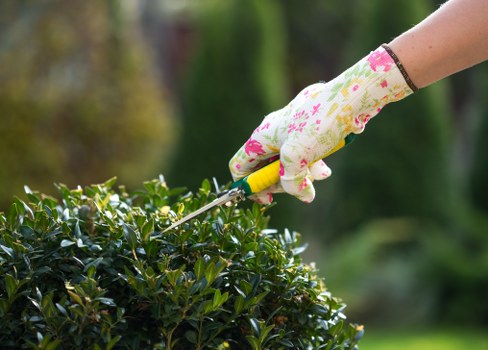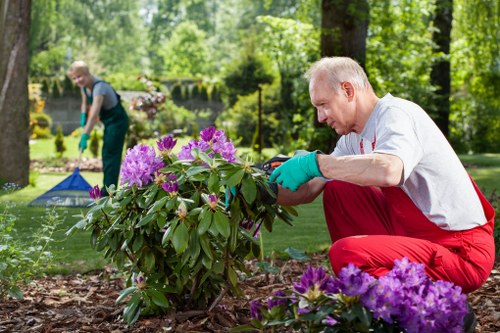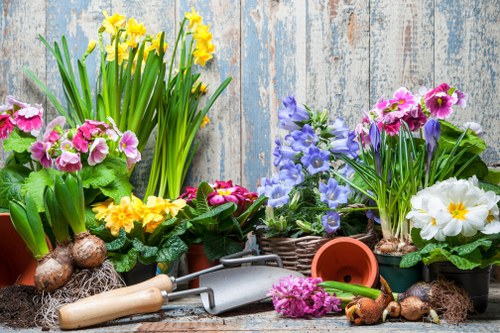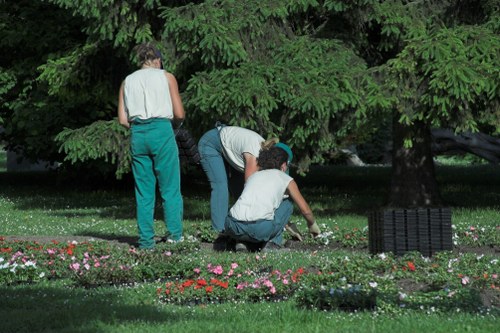Comprehensive Guide to Garden Maintenance in Richmond
Introduction to Garden Maintenance

Maintaining a beautiful garden in Richmond requires dedication, knowledge, and the right set of tools. Whether you're a seasoned gardener or a beginner, understanding the fundamentals of garden maintenance can help you achieve a thriving outdoor space.
Richmond's climate presents unique challenges and opportunities for garden enthusiasts. From the humid summers to the cool, crisp winters, each season affects your garden's health and appearance.
In this guide, we'll explore essential garden maintenance practices tailored specifically for Richmond's environment.
Understanding Richmond's Climate

Richmond enjoys a humid subtropical climate, characterized by hot summers, mild winters, and ample rainfall throughout the year. This climate is conducive to a wide variety of plants, but it also requires specific maintenance strategies to keep your garden in top shape.
The average temperature in Richmond during the summer months can reach up to 90°F (32°C), making it essential to select heat-tolerant plants and ensure adequate watering. In contrast, winter temperatures rarely drop below freezing, which minimizes the risk of frost damage but still requires some protective measures for sensitive plants.
Understanding these climatic conditions helps in choosing the right plants and scheduling maintenance tasks effectively.
Seasonal Garden Maintenance Tasks

Maintaining a garden year-round involves different tasks tailored to each season. Here's a breakdown of essential maintenance activities throughout the year:
- Spring: Planting new flowers and vegetables, pruning trees and shrubs, and preparing soil for the growing season.
- Summer: Regular watering, fertilizing, pest control, and deadheading spent blooms to encourage new growth.
- Autumn: Clearing fallen leaves, planting perennials, and protecting plants from early frosts.
- Winter: Minimal maintenance, focusing on pruning and planning for the upcoming growing season.
Adhering to these seasonal tasks ensures your garden remains healthy and vibrant throughout the year.
Soil Preparation and Fertilization

Healthy soil is the foundation of a thriving garden. In Richmond, soil types can vary, but most gardens benefit from regular soil testing to determine pH levels and nutrient content.
Soil Preparation: Before planting, enrich your soil with organic matter such as compost or well-rotted manure. This improves soil structure, enhances nutrient availability, and promotes beneficial microbial activity.
Fertilization: Depending on your soil test results, you may need to add specific fertilizers to address nutrient deficiencies. It's crucial to follow recommended application rates to avoid over-fertilization, which can harm plants and the environment.
- Nitrogen: Essential for leafy growth.
- Phosphorus: Important for root development and flowering.
- Potassium: Helps overall plant health and disease resistance.
Irrigation and Water Management

Efficient irrigation is critical, especially during Richmond's hot summers. Proper water management not only conserves water but also ensures your plants receive the hydration they need to thrive.
Consider installing a drip irrigation system, which delivers water directly to the plant roots, reducing evaporation and runoff. Mulching around plants can also help retain soil moisture and regulate temperature.
Regularly check your irrigation system for leaks or blockages, and adjust watering schedules based on seasonal changes and plant requirements.
Pruning and Trimming Techniques
Pruning is an essential aspect of garden maintenance that promotes healthy growth and enhances the aesthetic appeal of your garden. Proper pruning techniques help remove dead or diseased branches, improve airflow, and encourage new growth.
Here are some tips for effective pruning in Richmond:
- Timing: The best time to prune most plants is during the late winter or early spring before new growth begins.
- Tools: Use sharp, clean tools to make precise cuts and prevent the spread of diseases.
- Technique: Remove branches at the point of origin or just above a bud to guide the direction of new growth.
Regular pruning helps maintain the shape and health of your plants, contributing to an overall well-maintained garden.
Pest and Disease Management
Pests and diseases can pose significant threats to your garden's health. Effective management strategies are crucial to prevent infestations and minimize damage.
Integrated Pest Management (IPM): This approach combines biological, cultural, mechanical, and chemical methods to control pests sustainably.
- Biological Control: Introduce natural predators like ladybugs to manage aphid populations.
- Cultural Control: Rotate crops and practice good sanitation to reduce disease prevalence.
- Mechanical Control: Handpick pests or use barriers like nets to protect plants.
- Chemical Control: Use pesticides judiciously, opting for organic options when possible.
Monitoring your garden regularly and addressing issues promptly can help maintain a healthy and productive garden.
Choosing the Right Plants for Richmond
Selecting plants that are well-suited to Richmond's climate and soil conditions is vital for successful garden maintenance. Consider the following factors when choosing plants:
- Climate Adaptability: Choose plants that can thrive in Richmond's humid subtropical climate.
- Soil Compatibility: Ensure the plants are compatible with your soil type, whether it's sandy, clayey, or loamy.
- Sunlight Requirements: Match plants to the amount of sunlight your garden receives, whether full sun, partial shade, or full shade.
- Water Needs: Consider water-efficient plants to reduce irrigation demands during dry spells.
Native plants are often a great choice as they are adapted to the local environment and require less maintenance.
Mulching for Garden Health
Mulching is an effective garden maintenance practice that offers numerous benefits. It involves covering the soil surface with materials like bark, straw, or compost.
Benefits of mulching include:
- Moisture Retention: Helps keep the soil moist by reducing evaporation.
- Weed Suppression: Prevents weeds from establishing by blocking sunlight.
- Temperature Regulation: Keeps the soil cooler in summer and warmer in winter.
- Soil Improvement: Organic mulches break down over time, enriching the soil with nutrients.
Applying a 2-3 inch layer of mulch around your plants can significantly enhance garden health and reduce maintenance efforts.
Lawn Care and Maintenance
A well-maintained lawn complements your garden and enhances curb appeal. Here are some essential lawn care tips for Richmond:
- Mowing: Keep your lawn at an optimal height, usually around 3 inches, to promote healthy growth and prevent weed invasion.
- Watering: Water deeply but infrequently to encourage deep root growth. Early morning is the best time to water to minimize evaporation.
- Fertilizing: Apply fertilizers based on your lawn's specific needs, avoiding over-fertilization.
- Aeration: Aerate your lawn annually to improve soil compaction and enhance nutrient absorption.
Regular lawn maintenance ensures a lush and resilient grassy area that serves as the foundation for your garden.
Hardscape Maintenance
Hardscapes like patios, walkways, and fences are integral components of garden design. Proper maintenance ensures these structures remain functional and aesthetically pleasing.
Key maintenance tasks include:
- Cleaning: Regularly sweep patios and walkways to remove debris and prevent moss or algae growth.
- Repairs: Address cracks or damage promptly to prevent further deterioration.
- Painting and Sealing: Refinish fences and other wood structures to protect them from the elements.
- Weed Control: Remove weeds from grout lines and joints to maintain clean lines.
Maintaining hardscape elements enhances the overall appearance and functionality of your garden space.
Composting and Waste Management
[p]Creating a compost bin is an excellent way to recycle garden waste and kitchen scraps. Composting enriches your soil with organic matter, improving its structure and fertility.Here’s how to start composting:
- Choose a Location: Select a dry, shady spot near a water source.
- Add Materials: Combine green materials (vegetable scraps, grass clippings) with brown materials (leaves, straw).
- Maintain: Turn the compost regularly to aerate and speed up decomposition.
- Harvest: In a few months, your compost will be ready to use as a nutrient-rich soil amendment.
Effective waste management through composting reduces landfill contributions and provides your garden with invaluable nutrients.
Garden Tools and Equipment
Having the right tools is essential for efficient garden maintenance. Here are some must-have tools for Richmond gardeners:
- Pruners and Shears: For trimming and shaping plants.
- Garden Fork: Useful for turning soil and aerating compost.
- Spade and Shovel: Essential for digging and planting.
- Rake: For leveling soil and gathering leaves.
- Watering Can or Hose: For effective irrigation.
Investing in quality tools ensures they last longer and perform better, making your garden maintenance tasks easier and more enjoyable.
Plant Protection and Support
Protecting your plants from environmental stresses and supporting their growth are key aspects of garden maintenance.
Staking and Trellising: Support tall or climbing plants with stakes or trellises to prevent breakage and promote upright growth.
Protective Covers: Use frost covers or shade cloths to shield plants from extreme weather conditions.
Pest Barriers: Install physical barriers like netting to keep pests away from your plants.
Organic Gardening Practices
Embracing organic gardening practices not only benefits the environment but also promotes healthier plants. Here are some organic methods for garden maintenance:
- Natural Fertilizers: Use compost, manure, and bone meal instead of synthetic fertilizers.
- Biological Pest Control: Introduce beneficial insects to manage pest populations naturally.
- Crop Rotation: Rotate plant families each season to prevent soil depletion and reduce disease risk.
- Mulching: Apply organic mulches to improve soil health and moisture retention.
Adopting these practices leads to a more sustainable and resilient garden ecosystem.
Hiring Professional Garden Maintenance Services
While DIY garden maintenance can be rewarding, there are times when hiring professional services is beneficial. Professional gardeners in Richmond offer expertise and efficiency, ensuring your garden receives the best care.
Benefits of professional garden maintenance include:
- Expertise: Knowledge of local plant species and climate conditions.
- Time-Saving: Professionals can complete tasks more quickly and efficiently.
- Comprehensive Care: Access to specialized equipment and techniques for optimal garden health.
- Customized Services: Tailored maintenance plans to meet your garden's specific needs.
If you're overwhelmed with garden tasks or seeking to enhance your garden's beauty, consider contacting a professional garden maintenance service in Richmond.
Eco-Friendly Garden Practices
Incorporating eco-friendly practices into your garden maintenance routine contributes to environmental sustainability and enhances the health of your garden.
Here are some ways to make your garden more eco-friendly:
- Rainwater Harvesting: Collect rainwater to use for irrigation, reducing reliance on municipal water sources.
- Native Planting: Choose native species that require less water and are more resistant to local pests.
- Solar Lighting: Use solar-powered lights to illuminate your garden sustainably.
- Composting: Recycle organic waste to create nutrient-rich compost for your plants.
Implementing these practices not only benefits the environment but also creates a healthier and more resilient garden.
Landscape Design and Planning
Effective landscape design enhances the functionality and beauty of your garden. Planning involves selecting appropriate plants, arranging garden elements harmoniously, and considering the overall aesthetic.
Consider the following design principles:
- Balance: Create a balanced composition with symmetrical or asymmetrical arrangements.
- Unity: Ensure all elements work together cohesively to create a unified look.
- Focal Points: Incorporate focal points like sculptures, fountains, or standout plants to draw attention.
- Color Scheme: Choose a harmonious color palette that complements your home and surroundings.
Thoughtful landscape planning results in a garden that is both functional and visually appealing.
Sustainable Gardening Tips
Sustainability in gardening focuses on practices that protect the environment, conserve resources, and promote biodiversity.
Here are some sustainable gardening tips for Richmond:
- Use Native Plants: They require less water and are more resilient against local pests.
- Minimize Chemical Use: Opt for organic fertilizers and natural pest control methods.
- Conserve Water: Implement drip irrigation and mulch to reduce water usage.
- Promote Biodiversity: Plant a variety of species to attract pollinators and beneficial insects.
Adopting sustainable practices leads to a healthier garden and a healthier planet.
Maintaining Garden Paths and Walkways
Garden paths and walkways provide structure and accessibility to your garden. Proper maintenance ensures they remain safe and attractive.
Maintenance tips include:
- Regular Cleaning: Remove debris and weeds from paths to maintain a clean appearance.
- Weed Control: Apply weed barriers or regularly remove weeds to prevent them from taking over.
- Repairing Surfaces: Fix any cracks or uneven spots to ensure safe footing.
- Enhancing Aesthetics: Add mulch, gravel, or decorative stones to enhance the look of your walkways.
Well-maintained paths contribute to the overall functionality and beauty of your garden space.
Maximizing Small Garden Spaces
Even with limited space, you can maintain a vibrant and functional garden in Richmond. Here are strategies to maximize small garden areas:
- Vertical Gardening: Use trellises, vertical planters, or wall-mounted pots to grow plants upwards.
- Container Gardening: Utilize pots and containers to grow a variety of plants without taking up ground space.
- Compact Plant Varieties: Choose dwarf or compact plant varieties that fit well in smaller areas.
- Efficient Layout: Plan your garden layout to make the most of available space, ensuring easy access for maintenance.
With creative planning and the right techniques, small gardens can be both beautiful and easy to maintain.
Creating a Garden Maintenance Schedule
Having a structured maintenance schedule helps ensure that all necessary tasks are performed regularly, keeping your garden healthy and attractive.
Here’s a sample maintenance schedule for Richmond gardens:
- Weekly: Watering, weeding, and inspecting plants for pests or diseases.
- Monthly: Fertilizing, pruning, and mulching as needed.
- Seasonally: Planting, adjusting irrigation systems, and preparing soil.
- Annually: Soil testing, major pruning, and landscape redesign if necessary.
Adjust the schedule based on your garden's specific needs and local climate conditions.
Benefits of Regular Garden Maintenance
Consistent garden maintenance offers numerous benefits, enhancing both the aesthetics and functionality of your outdoor space.
- Healthier Plants: Regular care prevents diseases and promotes robust growth.
- Increased Curb Appeal: A well-maintained garden enhances your home's appearance.
- Higher Property Value: Beautiful landscaping can increase your property's market value.
- Personal Satisfaction: Gardening can be a relaxing and rewarding hobby.
Investing time and effort in garden maintenance yields long-term rewards, creating a sanctuary you can enjoy year-round.
Innovative Gardening Techniques
Embracing innovative gardening techniques can simplify maintenance and boost garden productivity.
Consider implementing the following methods:
- Hydroponics: Growing plants in nutrient-rich water solutions, reducing the need for soil.
- Permaculture: Designing garden ecosystems that mimic natural processes, promoting sustainability.
- Smart Irrigation: Using technology like moisture sensors and automated watering systems for efficient water use.
- Companion Planting: Planting compatible species together to enhance growth and deter pests.
These techniques can lead to more efficient maintenance and healthier, more productive gardens.
Conclusion: Achieving a Thriving Garden in Richmond
Maintaining a garden in Richmond involves understanding the local climate, selecting appropriate plants, and adhering to regular maintenance practices. By following the strategies outlined in this guide, you can create and sustain a beautiful, healthy garden that thrives year-round.
Whether you choose to maintain your garden yourself or hire professional services, the key is consistency and attention to detail.
Ready to transform your garden? Contact us today to schedule your garden maintenance service and enjoy a lush, vibrant outdoor space all year long.

